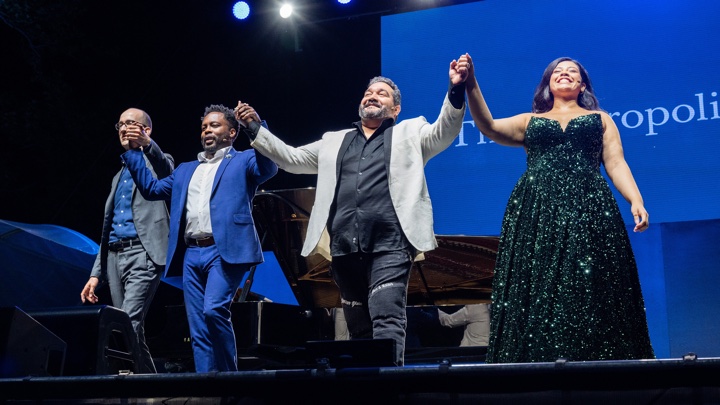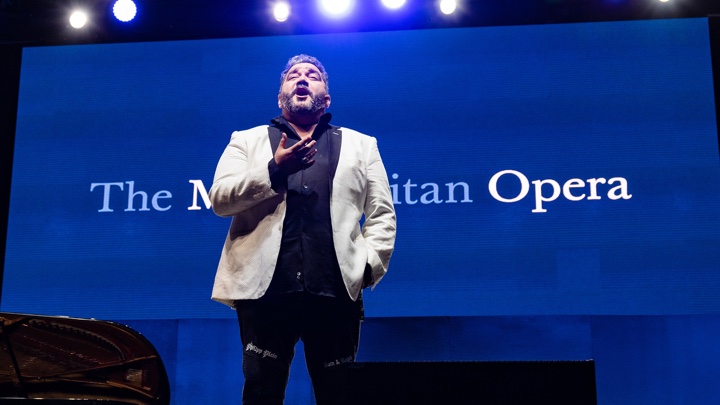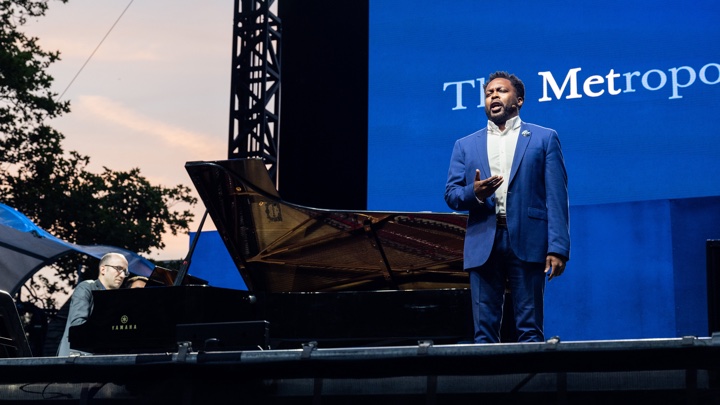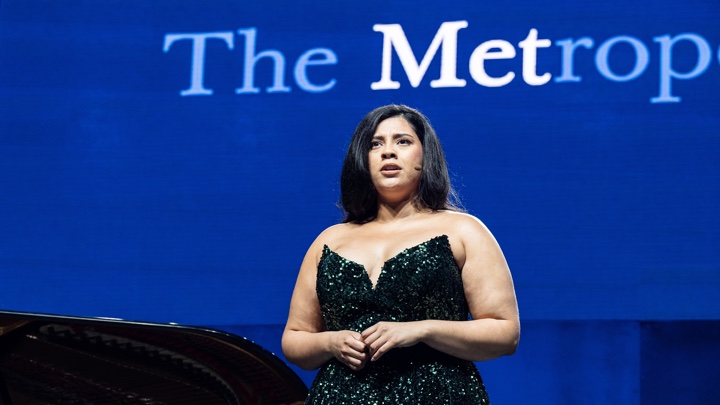

After some experimentation, in July 2009 Peter Gelb instituted Summer Recitals in the Park featuring Lisette Oropesa, Paulo Szot (Met debut) and Alek Shrader with Vlad Iftinca on the piano at Summerstage. Since then the newly-minted summer tradition has continued annually with one established Met performer flanked by two newcomers in a popular program of arias, duets, operetta and musical theater with piano accompaniment.
On June 20, a rather breezy, pleasant cool summer evening, the soprano Gabriella Reyes, tenor René Barbera and baritone Will Liverman took over the Summerstage space with a wide-ranging, ambitious recital program with Dimitri Dover tickling the ivories. There was the usual mix of popular opera selections, operetta chestnuts but no classic Broadway musical theater this time (and it wasn’t missed).
I have to say that the amplification was discreet and did not distort the voices. But one could still tell that Liverman has an instrument of more modest volume than his colleagues (though lovely in timbre and sensitive to nuance and text).
Barbera started off the evening with a dashing account of “Questo o quella” from Verdi’s Rigoletto revealing a typical bright/dark bronzed Hispanic timbre. The core of the voice is solid with a dark richness in the middle (which is fuller and steadier than that of his colleague Javier Camarena these days) and a bright pinging top that can sparkle like his silver sequined sneakers.
The San Antonio Texas-born tenor started out as a Rossini specialist making his Met debut as Lindoro in L’Italiana in Algeri in 2016. (Rossini still is central to his career—this August he will perform Adelaide di Borgogna at the Pesaro Rossini Festival) It is increasingly evident that Barbera’s voice and repertory are slowly expanding beyond the tenore di grazia fach into standard lyric tenor rep.
I was impressed by his performance as the tenor soloist in Verdi’s Requiem with Teodor Currentzis and musicAeterna at the Shed in 2019. He reaffirmed that good impression with a wittily acted and sung cameo turn as the Italian Tenor in Der Rosenkavalier at the Met earlier this Spring. Barbera needs to be cultivated as a Met regular as he has a voice of greater color and technical facility than several of his tenor colleagues at the theater.
Next up was Liverman (also wearing some snazzy metallic kicks) singing “Madamina, il catalogo è questo” from Don Giovanni. Liverman with his compact frame, suave light baritone and relatively cool stage manner seems more a Masetto or Don Giovanni (in a small house) than a buffo Leporello. This was a silkily sung, subtly limned reading of the aria that eschewed vocal hamming and leering. It was a rather different but refreshing straightforward take.
Budding lirico-spinto soprano Gabriella Reyes swept on in an green sequined off the shoulder ballgown performing Nedda’s aria “Qual fiamma avea nel sguardo… Stridono lassù” from I Pagliacci. Reyes’ dark smoky pomegranate timbre, firm but not blooming top and fast vibrato reminded me of early 20th century Italian “Cetra” sopranos like Iva Pacetti, Mafalda Favero, Pia Tassinari, Onelia Fineschi et al.
The outdoor park setting provided Ms. Reyes with some perfectly cast co-stars as a bird alighted from the grass flying right in front of her just as she was about to sing “Che volo d’augelli”. Ms. Reyes smiled with delight and launched lustily into the aria to the pleasure of the audience.
Reyes will be performing in Daniel Catán’s Florencia en el Amazonas next season at the Met in the role of Rosalba. Later in the first half, she gave us a preview of that Met premiere with a smoldering rendition of the verismo sounding “Escúchame” which is Florencia’s final aria where she realizes she will never reach Manaus or her lost lover. It was quite tantalizing.
Messrs. Barbera and Will Liverman found a pleasing blend in the evergreen, ever welcome “Au fond du temple saint” from Les Pêcheurs de Perles. Mr. Barbera later sang “Je crois entendre encore” in I believe the lower key. A little more float in the soft, voix-mixte high phrases would be welcome and his complex Latin timbre isn’t ideal for French music. But he was confident in the tricky tessitura which can sit in the passaggio—it is a deceptively difficult, treacherous solo.
I was delighted by Mr. Liverman’s beautiful legato in the lecturing aria of the titular protagonist of Tchaikovsky’s Eugene Onegin. I was even more delighted by the pianissimo high note with which he capped the final phrase.
Ms. Reyes and Mr. Barbera flirted, defied, mocked and teased through Nemorino and Adina’s duet from L’Elisir d’Amore “Esulti per la Barbara”. Both singers have strong, theatrical personalities and Barbera’s antics were amusing without stooping into buffoonery while Reyes flirted and simpered like a born coquette—both displayed welcome vocal flexibility.
All three singers were relaxed and can have fun on stage which the audience always finds contagious.
After the intermission break, grand opera alternated with operetta with some last-minute substitutions and additions to the program.
Ms. Reyes danced and clapped her way around the stage swishing her sparkling green skirts in a vampy, campy rendition of “Mein Lippen, sie küssen so heiss” from Lehár’s Giuditta. She contrasted that with a stark, sorrowful “Signore Ascolta” from Puccini’s Turandot and a chesty, committed performance of the zarzuela favorite “Carceleras” from Chapí’s Las Hijas del Zebedeo. Reyes has her own typical dark/bright bronzed classically Hispanic timbre.
Her final piece was a late addition—“Chi il bel sogno di Doretta” from Puccini’s La Rondine. I found that in the ecstatic final phrases, Reyes firmly attacked the high notes but didn’t spin them out, cutting them short abruptly. I think a more piano attack and softly spun sustained breath control might achieve a more pleasing result.
In Alfredo’s Act II aria “Lunge da lei… De’ miei bollenti spiriti”, Barbera showed the fuller lyric capabilities of his versatile tenor capping the cabaletta “O mio rimorso” with a firm high C. Mr. Barbera again showed lots of personality, humor and stage experience in a role familiar to him—Count Almaviva in Il barbiere di Siviglia. He and Mr. Liverman sparked off of each other deftly in the Act I duet “All’idea di quel metallo” from the Rossini chef d’oeuvre acting out their roles with gesture and facial expression.
Barbera then blazed through lusty renditions of “Granada” and “Non puede ser” from the zarzuela La Tabernera del Puerto by Sorozábal (both pieces favored by Plácido Domingo in his stadium concerts).
Mr. Liverman again revealed his deep commitment to Black music with his renditions of the spiritual “Steal Away” and his solo “There was a storm” from Terence Blanchard’s Fire Shut Up in my Bones. Beautifully nuanced textual delivery and fervent commitment were central to his interpretations.
Liverman has a newish cd recital available of songs by African-American composers entitled “Dreams of a New Day—Songs by Black Composers” on the Cedille label.
Here I must harken back to this past February 15, when Mr. Liverman performed selections from that album with collaborative pianist Paul Sánchez at Alice Tully Hall in a program sponsored by the Metropolitan Opera. It was one of the most remarkable recitals I have seen in a great many years. Mr. Liverman had each song (by composers such as Florence Price, Damien Sneed, Margaret Bonds, Shawn Okpebholo, Harry Burleigh, Leslie Adams, Robert Owens et al.) fully memorized and internalized.
The effect was of giving testimony in a church—the confession of a spiritual individual revealing his own uniquely personal story sharing his deep faith and experience. Except that that experience was of a whole people with the testimony revealing a microcosm of human suffering and triumphant survival. His crystal-clear diction and wide dynamic range (including that same pianissimo that had the audience in his thrall in the Onegin solo) illuminated each song. Liverman repeated that program at the Princeton Festival on Juneteenth, the day before this concert. If you have a chance to see him in recital, go!
The evening ended not with the scheduled trio of “O sole mio” but with Barbera in an ebullient traversal of the Duke’s second aria from Rigoletto “La donna è mobile” which the whole audience knew and greeted with applause.
Mr. Dover was supportive and highly musical—sometimes I felt too much so. Some pieces needed more rhythmic propulsion and occasionally there was a carelessness in the phrasing of some pieces that revealed how a conductor’s leadership can help a singer.
It was a quite happy evening all around with some imaginative programming. It will be repeated this Friday June 23 at Brooklyn Bridge Park starting at 7:00 pm. Brooklyn Bridge Park is right by the East River with a view of the lit up downtown Manhattan skyline at sundown providing a spectacular backdrop to the music.
Meanwhile, coloratura soprano Erica Baikoff, baritone Thomas Glass and mezzo Cierra Byrd bring an alternate program heavy on Donizetti, French opera and Handel to the outer boroughs on June 24, 26, 28 and 30 at 7:00 pm. Grab a blanket and a bottle of prosecco and enjoy!
Photos: Jonathan Tichler / Met Opera




























Comments